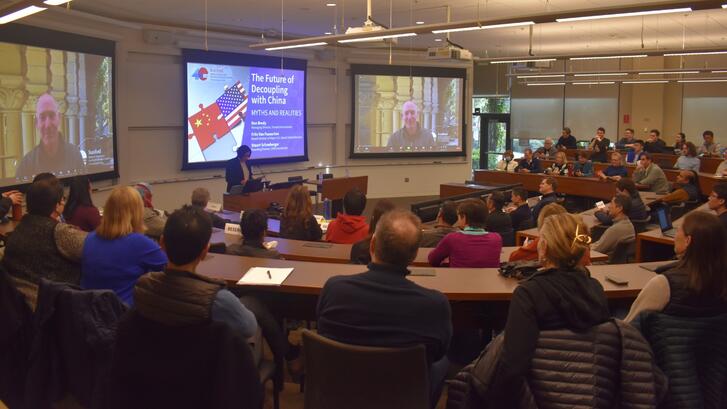Vinod Khosla Shares Insights Into Future of Sino-American Tech Competition
Vinod Khosla Shares Insights Into Future of Sino-American Tech Competition
Emergent technology such as artificial intelligence will shape the next several decades. APARC’s China Program spoke with Vinod Khosla, co-founder of SUN Microsystems, who believes that the rapid pace of technological advance is bringing us to the brink of a "tech war."

Tech investors are increasingly turning their interest towards revolutionary emerging technologies such as artificial intelligence, and experts are curious about what role these powerful technologies will play in the unfolding political and economic competition between the United States and China. Vinod Khosla, the co-founder of SUN Microsystems and founder of Khosla Ventures, sees more than competition. Rather, he warns of an escalation of international competition into a full-scale "tech war."
Mr. Khosla explained his view of such an upcoming “techno-economic war” between the world’s two superpowers at a recent discussion hosted by APARC’s China Program. Laura Stone, APARC's inaugural China Policy Fellow, joined Mr. Khosla for a fireside chat.
The event took place at a critical juncture in the U.S.-China tech competition, just weeks after U.S. members of a House panel united to emphasize their concerns over the popular app TikTok. TikTok's uncertain future in the U.S. has added strain on the U.S.-China relationship.
Mr. Khosla sees bipartisan criticism of TikTok as a validation of his concern about Chinese influence in the United States. He declared, "There's zero chance TikTok won't be controlled by the Communist Party. Zero chance," and went on to ask the audience, "Do we want that in this country?"
Mr. Khosla believes that countries’ ability to harness critical emerging technologies like AI and fusion energy will determine who will become a dominant power in the technological landscape of the 21st century. He went on to describe how technological competition has become a proxy for the ideological struggle between Western values and the Chinese political system. In his view, the United States must take measures to secure dominance in the tech field if it is to remain competitive on the world stage.
Sign up for APARC newsletter to receive analysis from our experts and guest speakers.
Above all, Mr. Khosla stressed that artificial intelligence technologies will radically redefine the world's economic systems and that as much as eighty percent of all economically valuable labor might be performed by AI in as short a timeframe as the coming twenty years. If this change comes to fruition, goods, especially professional expertise, will become much cheaper and more accessible, while at the same time income disparity grows drastically. In addition, he emphasized that AI will change the fields of national security and cybersecurity. With these coming foundational challenges to our current economic system and domestic security measures, he argued, the United States must take a more proactive stance towards promoting the development of technologies domestically and protecting them from foreign espionage.
However, Mr. Khosla believes that this "war" for technological supremacy reaches beyond the U.S.-China relationship. In his view, it is a "war for political philosophy: Western values and political philosophy versus Chinese political philosophy." In his eyes, this conflict of fundamental values stands at the center of the ongoing competition for technological development.
Forecasting Change
Mr. Khosla pointed out that economic benefits brought about by advanced technologies will be in high demand in developing countries. Developed nations that can provide advanced technological solutions, especially AI solutions, to developing nations will therefore become even more influential, carving a primary avenue of soft power and influence for whichever nation succeeds.
China's motivation is beyond national pride, "they believe they have a superior system," said Khosla. His primary anxiety is that a long-held assumption that the West will win this war for ideological supremacy may not be true, citing the rising trend of open-source technology as one factor that may tip the scales. Open-sourcing technology, he argued, allows foreign nations to take technology and benefit from it without adjusting their value systems or making a real contribution of their own. He warned that technology is not just an enabler of economic power, but also of political influence, and should be treated as such. Khosla warned, "It’s literally the dominant political philosophy of the planet that's at stake here.”
When asked to describe his views on the differing approaches to institutional regulation taken by Beijing and Washington, Khosla emphasized that the large technological innovations of the past century have rarely come from established institutions and businesses, referencing the examples of Uber, Airbnb, Tesla, and Amazon as innovative startups that could not have come from established large corporations.
He went on to cite the work of Philip Tetlock, describing the failure of expert opinion to forecast change. "Experts are almost never right," he continued, "and this is very important for the China question." Khosla argues that rather than focusing on how each nation regulates its large institutions, experts and analysts should turn their attention toward innovators and smaller actors making changes in a broad range of industries.
The conversation then turned to Mr. Khosla's participation in the Hill and Valley Forum, a China-critical alliance of Washington lawmakers and Silicon Valley executives. Mr. Khosla said that the importance of the forum is its bipartisan nature and how it provides a platform for collaboration to evaluate U.S. competitiveness against China.
Overall, Mr. Khosla's critical analysis focused largely on the risk posed by an imbalance in technological advances between the United States and China, especially in the context of heated economic competition between the two world powers. Khosla concluded the discussion with a sharp criticism of diplomacy that relies too heavily on mutual trust and expressed skepticism towards aims for cooperation between the United States and China.


